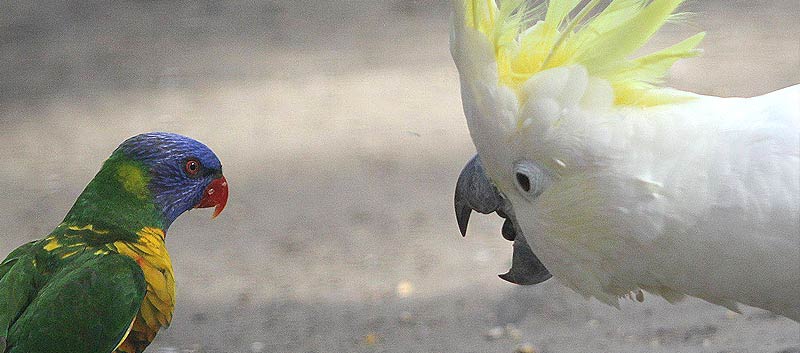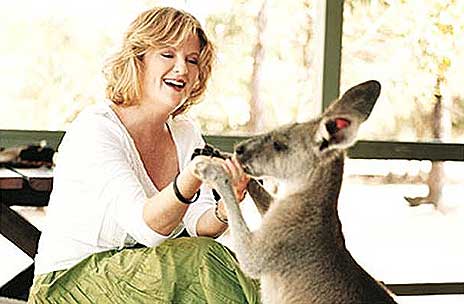Walakabout Sanctuary is situated at Calga on the Central Coast
Tassin Barnard, in concert with her husband Gerald, own and manage this wildlife sanctuary on the central coast of New South Wales
Walkabout Park’s Origins

Approaching the visitor’s centre at Walkabout Park, you suddenly realise you’re not alone.
It’s the kangaroos you notice first – big Eastern Greys hopping over to investigate newcomers – but if you stop to look a little closer you’ll also see wallabies, potoroos, pygmy possums and pademelons. Sensing someone looking over your shoulder, you spin around to find an emu trying to see what all the fuss is about. And pick your way carefully through the roo droppings that litter the veranda and you’ll meet Matilda, a Swamp Wallaby who came to this sanctuary as an orphan. She’s over 14 years old now and, after living wild in the bush at Walkabout Park for over a decade, has decided to make better use of ‘her humans’. Matilda presented herself at the Visitor Centre around about her 13th birthday, a little on the thin side, and asked for some extra food. Every since she has been hopping into the shop every morning and afternoon for that extra snack that she needs, now that age is starting to creep up on her. Ever the matriarch, it is quite clear who is the real boss at Walkabout Park, and it is NOT the Head Ranger..
How did a gentle and unpretentious South African insurance executive come to be the guardian of a unique slice of Australian cultural and environmental heritage?
 Tassin Barnard, in concert with her husband Gerald, own and manage this feral-proofed wildlife preserve on the central coast of New South Wales. Looking for a house in the bush with no neighbours, over a decade later they are still wondering how it came about that they are now the protectors of 80 acres of Australian bush alive with native wildlife and imprinted with ancient Aboriginal sites. For the first 5 years Tassin commuted between an executive job in high finance in Melbourne, and the magical haven that is Walkabout Park on the NSW Central Coast.
Tassin Barnard, in concert with her husband Gerald, own and manage this feral-proofed wildlife preserve on the central coast of New South Wales. Looking for a house in the bush with no neighbours, over a decade later they are still wondering how it came about that they are now the protectors of 80 acres of Australian bush alive with native wildlife and imprinted with ancient Aboriginal sites. For the first 5 years Tassin commuted between an executive job in high finance in Melbourne, and the magical haven that is Walkabout Park on the NSW Central Coast.
Previously known as the Calga Springs Sanctuary, the Australia Walkabout Wildlife Park has been open since April 2001, but came into the Barnards’ lives in September 2005. Situated a 50-minute drive north of Sydney, it’s the only feral-free natural bushland in NSW that also has the fortune to contain ancient Aboriginal sites, including cave paintings and middens. While the whole site is roughly 170 acres, the area free of feral predators amounts to 80 acres. Surrounded by a state-of-the-art fox- and cat-proof fence, the exclusion zone is home to around 180 species of mammals, birds, reptiles and frogs. Many of these animals are species on the verge of extinction, but here, protected from introduced dangers, they are thriving.
Serendipitous find
The Barnards had no intention of becoming the guardians of the native creatures of a foreign land; their only real desire was to find a bushland home for their family. When their real estate journey began, there was no way of knowing they would fall irrevocably in love with this unique but labour-intensive place. “We were looking, you could say, for a rural idyll,” says Tassin. “Gerald saw this place in a magazine. It was quite dramatic – he clutched it to his chest and said, ‘I’m about to show you something I know I’m going to regret!’ So I was incredibly curious when he finally handed it over.” Initially unimpressed by the ad, and Gerald’s enthusiasm, Tassin nevertheless agreed to have a look. “Even once we got here, I didn’t feel excited. It was so far from what we were looking for that I couldn’t relate to what I was seeing. I left, but I couldn’t get it out of my head.”
Tassin soon discovered the park had got under her skin. “It was just so alive,” she explains. “When you think of the bush, you think of quiet. What I realise now is that quietness is just aridity – it’s the result of our destruction of the environment.” The preserve is teeming with often uncelebrated animals, and over the hum of the freeway the air is suffused with the bustle of creatures in the undergrowth. Snakes, spiders and lizards, treated as vermin by city dwellers, are treasured members of this wild community.
The further the Barnards explored the park, the more committed to its survival they became. “Barry Cohen [minister for the Arts, Heritage and Environment in the Hawke Government] bought this place when he retired,” explains Tassin. “He said to me that at the end of his stint overseeing the environment he finally realised that it wasn’t humans who were the biggest threat to native animals, but the predators we’d introduced.” Inspired by his former portfolio, Barry Cohen bought the land, had it rezoned and spent 13 years predator-proofing the sanctuary. In 2005, ready to retire and move on to a more leisurely life, he put the park up for sale. “The more we saw and the longer we talked to Barry, the more I realised not just how important his mission was but how much potential this place has,” says Tassin.
10 Traumatic Years and $1,000,000
The Barnards had no way of knowing that they were about to embark on the fight of their lives. 10 days after taking up residence at Walkabout Park, the bulldozers moved into the bush next door. Rumbling up and down Walkabout Park’s fox-proof fence-line, the bulldozers destroyed the fox-proofing and the animals inside were immediately vulnerable. This was the start of a nightmare for the Barnards. The NSW State Government was in the process of trying to sell the state-owned land next door to a multinational sand quarry. Initially worried only about the noise and the dust and their impact on the animals of, and visitors to, Walkabout Park, the Barnards at that stage had little comprehension of the real dangers that lay in store.
As they frantically educated themselves about what would be affected by this development, they learned first about the endangered animal and plant species that would be destroyed. The dangers to the environment began to dawn on them, but they still had little understanding of the extent of what was at stake. As they learned about aquifers (the sandstone ‘spongue’ that holds the subeterranean watersupply that sustains the area) and about sand quarrying (not scooping up sand in the desert, but crushing the aquifer rock into sand to truck it away to Sydney to build houses and make cement products) their alarm grew. Then they heard about ‘hanging swamps’ and what they mean for the environment, and what would happen once their water supply was cut off. And what about the Aboriginal sites?
David and Goliath – when good prevails
The culmination of this learning journey was the insight into – and legal acknowledgement of – the fact that the Aboriginal cultural landscape of the area includes a Women’s Site that the archaeologists and anthropologists involved on both sides of the battle agreed is the most significant Aboriginal Women’s Place in NSW, that there were others but they are all known to have been destroyed! It was ultimately this that saved the Calga Valley.
After 8 years from 2005 to 2013 fighting a political fight to stop the NSW Planning Minister from approving the quarry, 2 years from 2013 to 2015 fighting a legal battle in the NSW Land and Environment Court to overturn the Planning Minister’s approval, the Barnards achieved what they had been told was not achievable. They had taken the government to court, and they had won! Costing them all of their savings, and all of the working capital that they should have been putting into Walkabout Park, with no hope of getting any of it back, they are still smiling (or, at least, smiling again). Walkabout Park and the Calga Valley have a future. It is a tenuous one as the environment is constantly under siege by greedy and short-sighted developers and politicians, but they did win and the law is now on their side.
